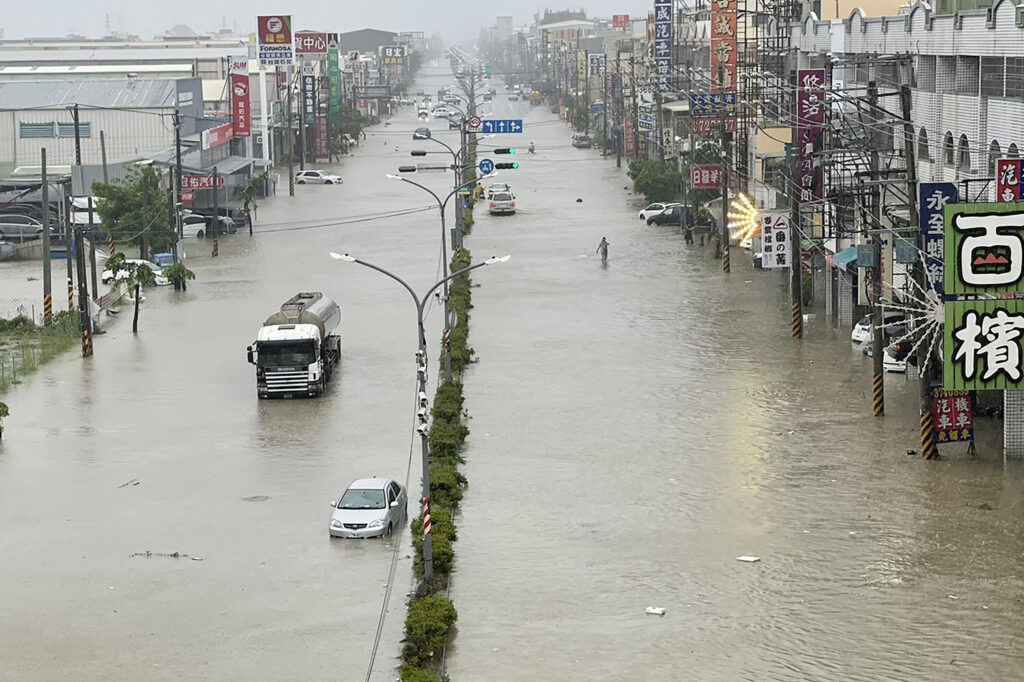
People and vehicles wade through the water along a street that was flooded by Typhoon Gaemi in Kaohsiung on July 25, 2024. | AFP
The strongest typhoon to hit Taiwan in eight years killed five people and flooded parts of the island’s second-biggest city on Thursday, with rescuers searching for six sailors missing after their cargo ship sank in the storm.
Typhoon Gaemi transformed streets in southern Kaohsiung city into rivers, with some households flooded by rainwater. Schools and offices were closed in several cities for a second day, with the stock market suspended and thousands of people evacuated.
READ MORE:
21 dead after Typhoon Carina pounds PH – PNP
Typhoon Carina: Metro Manila under state of calamity
Gaemi also exacerbated seasonal rains in the Philippines on its path to Taiwan, triggering flooding and landslides that killed 20 people. A tanker carrying 1.4 million litres of oil sank off Manila on Thursday, with authorities racing to contain a spill.
The storm had weakened by Thursday morning and “the centre has moved out to sea” at around 4:20 am local time (2020 GMT), Taiwan’s weather authorities said.
Taiwan’s fire agency said it received a report early Thursday that a cargo ship had sunk off the island’s southwestern coast, forcing its nine Myanmar crew members to abandon ship in life jackets.
“They fell into the sea and were floating there,” said Hsiao Huan-chang, head of the fire agency.
This handout picture taken and released on July 25, 2024 by the Taiwan Coast Guard shows the Indonesia-flagged cargo ship Iriana stranded near the coast in Pingtung County during Typhoon Gaemi. AFP PHOTO / Taiwan Coast Guard”
Hsiao did not specify when the Tanzania-flagged ship sank but adverse weather conditions hindered the search, which involved rescue aircraft and had been ongoing since 3:30 pm (0730 GMT).
Taiwan’s Coast Guard later issued a statement saying that two crew members were brought to a police station in the late afternoon.
“They were confirmed to be the first mate and chef of the ship,” the coast guard said, adding that authorities expanded a shore patrol and found another sailor.
“The Coast Guard will continue to expand the search for the remaining crew members who fell into the sea,” it said.
Gaemi made landfall in China’s Fujian province shortly before 8:00 pm local time (1200 GMT) on Thursday, Chinese state broadcaster CCTV said.
Mudslides, falling trees
In southern Taiwan’s Pingtung county, an Indonesian freighter had to be anchored at a beach during the storm, with local TV footage showing massive waves crashing into it.
Taiwan’s Coast Guard said the crew was safe, “with no loss of power and oil leakage”.
Gaemi made landfall in Taiwan on Wednesday night with sustained wind speeds of 190 kilometres (118 miles) per hour at its peak.
At least five people were confirmed killed and as many as 500 were reported injured.
A motorist in Kaohsiung was crushed by a tree and a woman in eastern Hualien died after part of a building fell on her.
A third person was killed when mudslides hit two houses in Kaohsiung, trapping two people. A woman was rescued from one but the second person was found dead.
Another man was killed in southern Tainan, authorities said, while a fifth person was killed by a falling tree.
Taiwan’s defence ministry also announced Thursday that its annual Han Kuang war games, in which some drills had already been cancelled due to the weather, had ended a day early and troops were sent to help local governments with disaster rescue work instead.
Hundreds of domestic and international flights were cancelled again because of the storm.
Flood warnings
Fujian province in China had already suspended all train services and put in place the second-highest flood warning alert level before the storm arrived.
The national water resources ministry warned on Wednesday that extremely heavy rains were expected to swell rivers and lakes in Fujian and the neighbouring province of Zhejiang.
In the Philippines, clean-up efforts were under way Thursday in the capital Manila as residents and business owners dumped soaked mattresses, bags of rubbish and other debris on muddy streets.
Street vendor Zenaida Cuerda, 55, said the food she had been selling had washed away and her house in Manila was flooded.
“All my capital is gone,” Cuerda told AFP. “I have nothing now, that’s my only livelihood.”
The region experiences frequent tropical storms from July to October but experts say climate change has increased their intensity, leading to heavy rains, flash floods and strong gusts.

